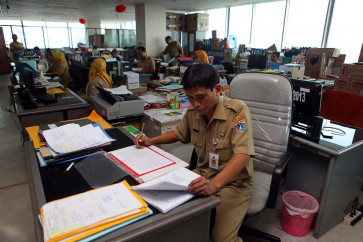Popular Reads
Top Results
Can't find what you're looking for?
View all search resultsPopular Reads
Top Results
Can't find what you're looking for?
View all search resultsExperts urge caution as govt allows hybrid work for civil servants
In a bid to improve the productivity of civil servants, President Joko “Jokowi” Widodo signed Presidential Regulation (Perpres) No. 21/2023 on Wednesday granting them greater working flexibility.
Change text size
Gift Premium Articles
to Anyone
I
n a bid to improve the productivity of civil servants, President Joko “Jokowi” Widodo signed Presidential Regulation (Perpres) No. 21/2023 on Wednesday granting them greater working flexibility. Experts, however, have cautioned that the regulation could have the opposite effect, arguing that it is too soon for the government to implement flexible working arrangements for the civil service.
“State civil apparatus [ASN] members can perform their duties with flexibility, both in terms of location and in time,” Article 8 of the regulation states. Even if civil servants are to adopt this flexible working arrangement they will still have to work the required 37 hours and 30 minutes, or 32 hours and 30 minutes during Ramadan, per week as stipulated in the regulation.
In the past, regulations on shorter working hours during Ramadan had to be signed each year. While the latest regulation does not specify if overtime will be available for civil servants, hours spent working on top of the required time may count toward an employee’s performance.
The idea to grant more flexibility to civil servants has been mulled since last year, with Administrative and Bureaucratic Reform Minister Abdullah Azwar Anas saying in December that his ministry was preparing a ministerial regulation on the issue, also known as work-from-anywhere (WFA).
While Azwar cited the success of the work-from-home policy implemented during the COVID-19 pandemic as the reason behind his support for more flexible working arrangements, public policy expert Agus Pambagio warned the government against jumping the gun in implementing this regulation.
“They might want to consider doing a trial run for six months and review the results first,” Agus told The Jakarta Post on Monday. “Civil servants can be a bit of a law unto themselves, and if they’re provided with [flexible working arrangements], someone will have to take the responsibility of overseeing their work”.
Given their relatively high job security, stereotypes of lazy civil servants persist among Indonesians. In the past, various local public order agencies (Satpol PP) have even conducted raids in public places for civil servants who are no-shows during office hours.

















